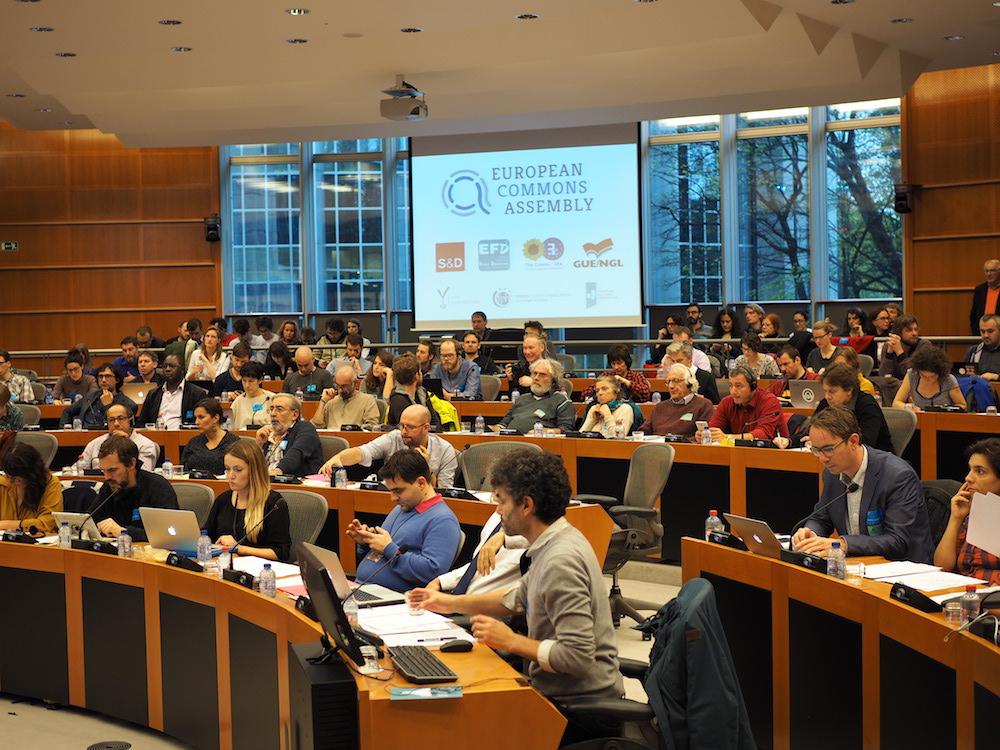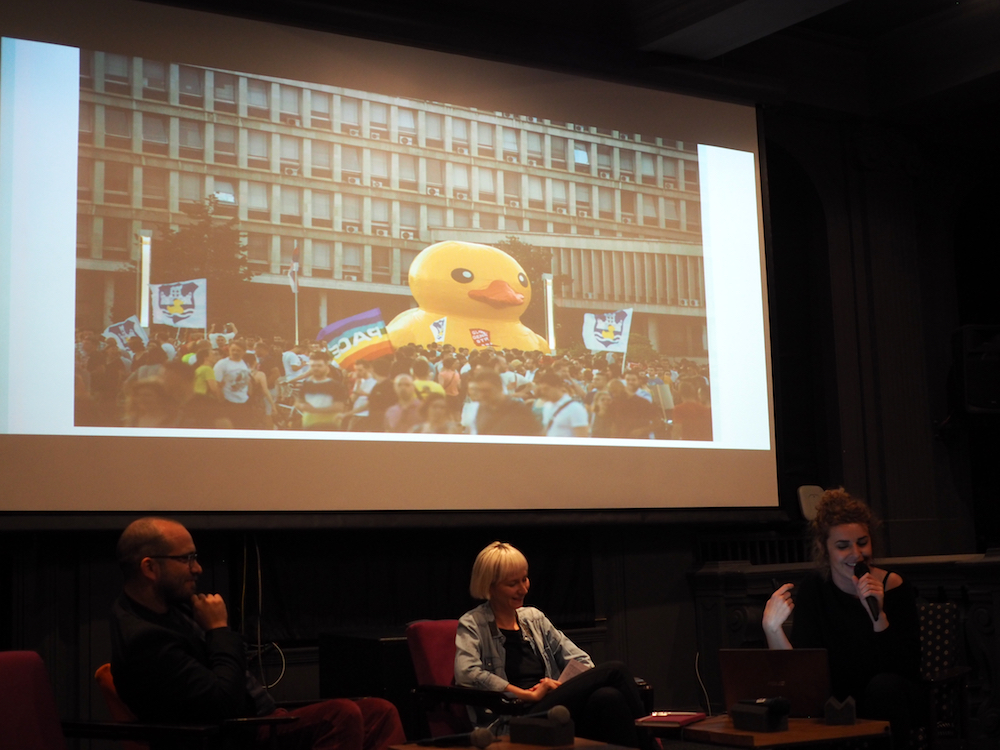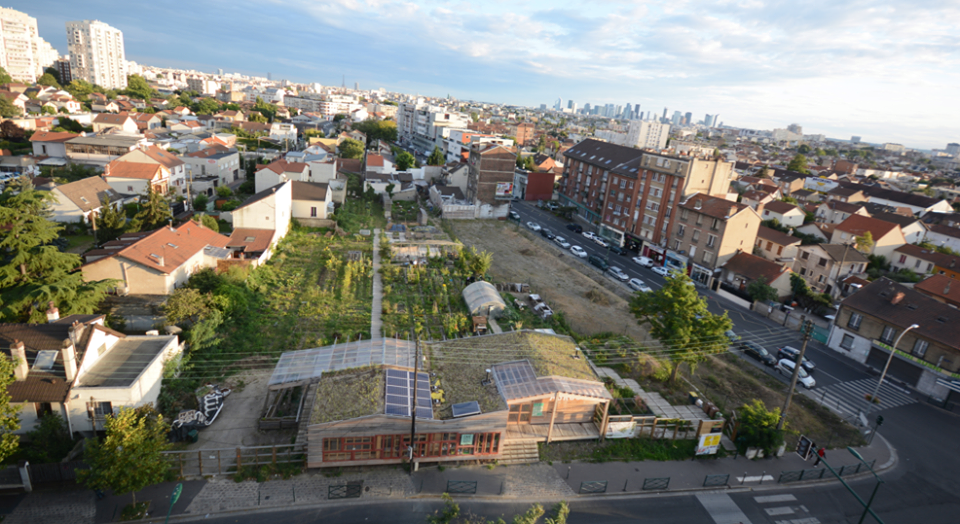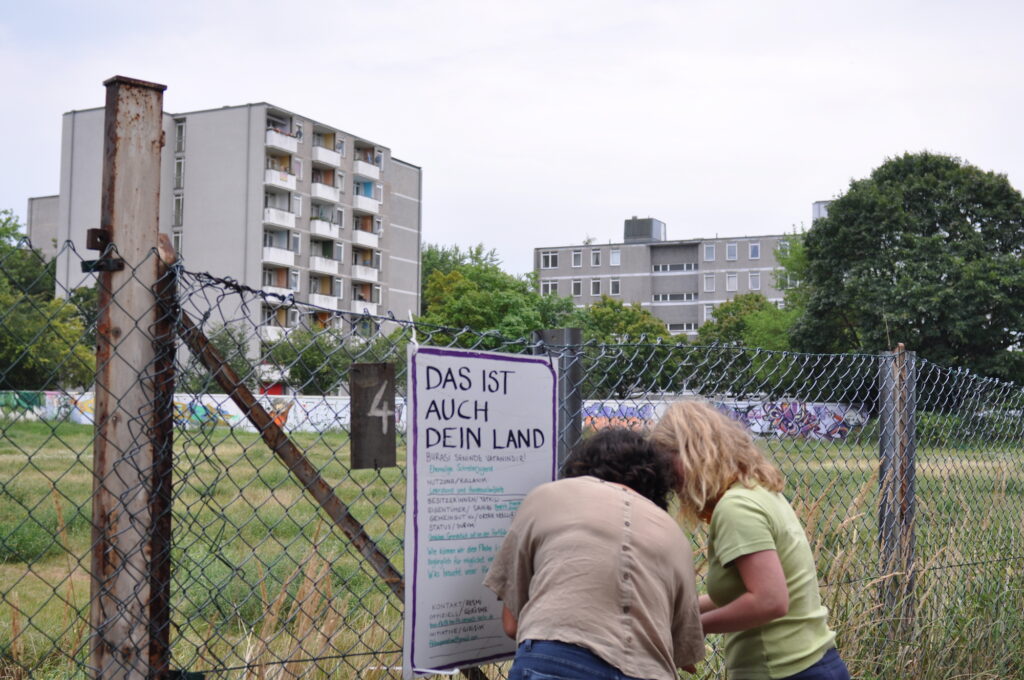European Commons Assembly

Prinzessinnengärten und Nachbarschaftsakademie haben im November zusammen mit über 150 Commonern aus 16 europäischen Ländern an der ersten European Commons Assembly in Brüssel teilgenommen. Um das Thema Commons / Gemeingüter auch auf der Gesetzgebungsebene der Europäischen Union zu verankern, gab es im Europäischen Parlament einen Austausch mit der fraktionsübergreifenden Intergruppe zum Thema common goods and public services.
 (mehr …)
(mehr …)
Commons Workshop in Zagreb

Auf Einladung des Institute for Political Ecology und der Green European Foundation hat die Nachbarschaftsakademie an dem Seminar „Urban Commons – Commoning the City“ in Zagreb teilgenommen.Mit dabei waren unter anderen Iva Čukić vom Ministarstvo prostora (Ministry of Space) und von Ne davimo Beograd (Don’tlet Belgrade drown), die zehntausende Menschen auf die Strasse bringen, um ein umstrittenes Investorenprojekt zu verhindern; Lucia Lois vom Sozialzentrum Patio Maravillas in Madrid, die die Geschichte des im letzten Jahr geräumten Zentrums dargestellt hat und die Veränderungen in der politischen Landschaft durch den Sieg des Wahlbündnisses Ahora Madrid, Alma Midžić von Crvena, die in Sarajewo gegen die Privatisierung des einzig öffentlichen Krankenhauses kämpfen; Matic Primc from INICIATIVA MESTNI ZBOR (IMZ), die offene Stadtteilversammlungen in 11 Bezirken Maribors organisieren. Daneben gab es zahlreiche lokale Initiativen, darunter Pravo na grad (Right to the City Zagreb) and parkticipacija. Letztere haben, auch inspiriert von Berliner Beispielen wie dem Allmende-Kontor und den Prinzessinnengärten, inzwischen schon 12 Gemeinschaftsgärten in Zagreb initiiert. (mehr …)
(mehr …)
Postponed
We just got the news that despite a big wave of support (17 000 people) a court ruled in favor of evicting the pilot project Agrocité / R-Urban to build of a temporary privat parking lot. We therefor unfortunately have to postpone the public event and the workshop with atelier d’architecture autogérée planned for the 14th and 15th of October.
We wish Doina and Constantin all the strength and solidarity they need. We are sure they will find a new way, a new place, and a lot of support and friends to continue the work.
The commons is, at its core, a very old – and a very new, recently rediscovered – system of governance for managing resources … In its largest sense, the commons is about stewardship of the things that we own in common as human beings. (David Bollier)
Building upon the practices of commons and commoning as a third way beyond the state and the market, this workshop aims at mapping existing practices as well as figuring out problems, potentials and methodologies.

Foto: R-Urban in Colombes
In the workshop we will discuss the idea of the commons and try to understand how this can help to describe or frame practices of commoning in places like R-Urban, Prinzessinnengärten and other bottom-up projects. In the workshop we will refer to methodologies and strategies, which we and others worked with before – like the university course “The Common as Urban Topology” (Die Allmende als urbane Typologie) at the Technical University (TU, Berlin)1, the commons-project realised by Stadt von Unten (Berlin) and 596 Acres (New York) in the last year’s program at the Nachbarschaftsakademie, and the ongoing MAZI-project on local digital networks.

Making the commons visible. Collaboration of 596 Acres (New York) and Stadt von Unten in the Nachbarschaftsakademie 2015
The notion of commons is historically often referred to as a agricultural system of resource management during the feudal times in Europe, where peasants were living, farming and gleaning on the common land, which capitalism then enclosed and privatized. The commons is also used as a concept describing contemporary and disparate practices, including the self-organization of public squares as a new form of protest or the cyberspace as digital commons.
Because the commons is neither public nor private but defines another shared practice, it offers a possibility for analysis as well as for the elaboration of existing and potential practices beyond the logic of the market and the state. But how can this abstract notion work in concrete terms? We want to discuss how to identify or implement ideas and practices of commoning in specific locations.What concrete practices and arrangements can we imagine? What are the obstacles or contradictions? What are the examples we can refer to? How can we share experiences and the knowledge of commons and commoning?
If you want to take part in the workshop, please send us a mail to: nachbarschaftsakademie@prinzessinnengarten.net
The workshop is part of „Locating and Figuring Care and Commons in the Rurban Realm“. This project of common grounds / Nachbarschaftsakademie is made possible by Perspektive, a German-French fund for contemporary art and architecture initiated by the Bureau des arts plastiques (Institut français Deutschland) and the French embassy. In May of 2016 we took part in the Workshop Resilience en réseau at the Université Civique R-Urban in Paris.
Postponed
We just got the news that despite a big wave of support (17 000 people) a court ruled in favor of evicting the pilot project Agrocité / R-Urban to build of a temporary privat parking lot. We therefor unfortunately have to postpone the public event and the workshop with atelier d’architecture autogérée planned for the 14th and 15th of October.
We wish Doina and Constantin all the strength and solidarity they need. We are sure they will find a new way, a new place, and a lot of support and friends to continue the work.
The commons is, at its core, a very old – and a very new, recently rediscovered – system of governance for managing resources … In its largest sense, the commons is about stewardship of the things that we own in common as human beings. (David Bollier)
Building upon the practices of commons and commoning as a third way beyond the state and the market, this workshop aims at mapping existing practices as well as figuring out problems, potentials and methodologies.

Foto: R-Urban in Colombes
In the workshop we will discuss the idea of the commons and try to understand how this can help to describe or frame practices of commoning in places like R-Urban, Prinzessinnengärten and other bottom-up projects. In the workshop we will refer to methodologies and strategies, which we and others worked with before – like the university course “The Common as Urban Topology” (Die Allmende als urbane Typologie) at the Technical University (TU, Berlin)1, the commons-project realised by Stadt von Unten (Berlin) and 596 Acres (New York) in the last year’s program at the Nachbarschaftsakademie, and the ongoing MAZI-project on local digital networks.

Making the commons visible. Collaboration of 596 Acres (New York) and Stadt von Unten in the Nachbarschaftsakademie 2015
The notion of commons is historically often referred to as a agricultural system of resource management during the feudal times in Europe, where peasants were living, farming and gleaning on the common land, which capitalism then enclosed and privatized. The commons is also used as a concept describing contemporary and disparate practices, including the self-organization of public squares as a new form of protest or the cyberspace as digital commons.
Because the commons is neither public nor private but defines another shared practice, it offers a possibility for analysis as well as for the elaboration of existing and potential practices beyond the logic of the market and the state. But how can this abstract notion work in concrete terms? We want to discuss how to identify or implement ideas and practices of commoning in specific locations.What concrete practices and arrangements can we imagine? What are the obstacles or contradictions? What are the examples we can refer to? How can we share experiences and the knowledge of commons and commoning?
If you want to take part in the workshop, please send us a mail to: nachbarschaftsakademie@prinzessinnengarten.net
The workshop is part of „Locating and Figuring Care and Commons in the Rurban Realm“. This project of common grounds / Nachbarschaftsakademie is made possible by Perspektive, a German-French fund for contemporary art and architecture initiated by the Bureau des arts plastiques (Institut français Deutschland) and the French embassy. In May of 2016 we took part in the Workshop Resilience en réseau at the Université Civique R-Urban in Paris.
Postponed
We just got the news that despite a big wave of support (17 000 people) a court ruled in favor of evicting the pilot project Agrocité / R-Urban to build of a temporary privat parking lot. We therefor unfortunately have to postpone the public event and the workshop with atelier d’architecture autogérée planned for the 14th and 15th of October.
We wish Doina and Constantin all the strength and solidarity they need. We are sure they will find a new way, a new place, and a lot of support and friends to continue the work.
The commons is, at its core, a very old – and a very new, recently rediscovered – system of governance for managing resources … In its largest sense, the commons is about stewardship of the things that we own in common as human beings. (David Bollier)
Building upon the practices of commons and commoning as a third way beyond the state and the market, this workshop aims at mapping existing practices as well as figuring out problems, potentials and methodologies.

Foto: R-Urban in Colombes
In the workshop we will discuss the idea of the commons and try to understand how this can help to describe or frame practices of commoning in places like R-Urban, Prinzessinnengärten and other bottom-up projects. In the workshop we will refer to methodologies and strategies, which we and others worked with before – like the university course “The Common as Urban Topology” (Die Allmende als urbane Typologie) at the Technical University (TU, Berlin)1, the commons-project realised by Stadt von Unten (Berlin) and 596 Acres (New York) in the last year’s program at the Nachbarschaftsakademie, and the ongoing MAZI-project on local digital networks.

Making the commons visible. Collaboration of 596 Acres (New York) and Stadt von Unten in the Nachbarschaftsakademie 2015
The notion of commons is historically often referred to as a agricultural system of resource management during the feudal times in Europe, where peasants were living, farming and gleaning on the common land, which capitalism then enclosed and privatized. The commons is also used as a concept describing contemporary and disparate practices, including the self-organization of public squares as a new form of protest or the cyberspace as digital commons.
Because the commons is neither public nor private but defines another shared practice, it offers a possibility for analysis as well as for the elaboration of existing and potential practices beyond the logic of the market and the state. But how can this abstract notion work in concrete terms? We want to discuss how to identify or implement ideas and practices of commoning in specific locations.What concrete practices and arrangements can we imagine? What are the obstacles or contradictions? What are the examples we can refer to? How can we share experiences and the knowledge of commons and commoning?
If you want to take part in the workshop, please send us a mail to: nachbarschaftsakademie@prinzessinnengarten.net
The workshop is part of „Locating and Figuring Care and Commons in the Rurban Realm“. This project of common grounds / Nachbarschaftsakademie is made possible by Perspektive, a German-French fund for contemporary art and architecture initiated by the Bureau des arts plastiques (Institut français Deutschland) and the French embassy. In May of 2016 we took part in the Workshop Resilience en réseau at the Université Civique R-Urban in Paris.





